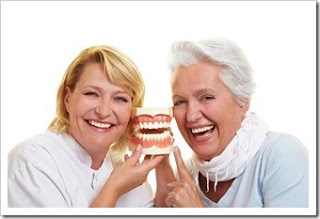What will it be like living with dentures?
People who are new to wearing dentures naturally have many questions about how their life will change.
New dentures may feel awkward for a few weeks until you become accustomed to them. The dentures may feel loose while the muscles of your cheek and tongue learn to keep them in place.
During this time, its not unusual to experience minor irritation or soreness. You may find that saliva flow temporarily increases.
As your mouth becomes accustomed to the dentures, these problems should diminish.
Dentures can be made to closely resemble your natural teeth so that little change in appearance will be noticeable. Dentures may even improve the look of your smile and help fill out the appearance of your face and profile.
Eating will take a little practice. Start with soft foods cut into small pieces. Chew slowly using both sides of your mouth at the same time to prevent the dentures from tipping. As you become accustomed to chewing, add other foods until you return to your normal diet.
Continue to chew food using both sides of the mouth at the same time. Be cautious with hot or hard foods and sharp-edged bones or shells.
Initially you may also find that wearing dentures changes how you speak. Pronouncing certain words may require practice. Reading out loud and repeating troublesome words will help. If your dentures “click” while you’re talking, speak more slowly.
You may find that your dentures occasionally slip when you laugh, cough or smile.
After your dentures are fitted, you’ll have a few follow-up appointments with your dentist to take care of any initial issues and to answer any questions you have.
Making living with dentures easy and comfortable
Your dentures were made to fit you precisely and, if they are cared for properly, they do not change shape.
But you may sometimes find that they can become loose due to natural changes in the gums and bone supporting them. As the jawbone begins to shrink, so do the gums.
If you find your dentures no longer fit properly, see your dentist as soon as possible so adjustments can be made.
Trying to change the fit of your dentures yourself can damage them and make them unrepairable so this would be a costly experiment!
Ill-fitting dentures repaired at home can also irritate the gums, tongue and cheeks.
In an emergency, you could use denture adhesives to keep the dentures stable until you are able to see the dentist.
Even if you no longer have your natural teeth, its still important to see your dentist regularly for an oral examination.
The dentist will examine your mouth to check for any problem with the gum ridges, the tongue and the joints of the jaw, as well as screen for oral cancer.
For a variety of reasons, many older adults are more susceptible to oral diseases, including oral cancer. About 95 percent of all cancers are found in people over age 40. However, many of these cancers are treatable if detected early.
Oral tissues are also checked for signs of other diseases that can first manifest themselves in the mouth.
Living with dentures can be comfortable if you continue to care for your oral hygiene and make regular visits to your dentist for a checkup.
How dentures can replace your smile
 If you’ve lost all of your natural teeth, whether from gum disease, tooth decay or injury, complete dentures can replace your missing teeth and your smile.
If you’ve lost all of your natural teeth, whether from gum disease, tooth decay or injury, complete dentures can replace your missing teeth and your smile.
Replacing missing teeth will benefit your appearance and your health.
Without support from the denture, facial muscles sag, making a person look older. You’ll also find it harder to eat and speak things that people often take for granted until their natural teeth are lost.
There are various types of complete dentures.
A conventional full denture is made and placed in the patients mouth after the remaining teeth are removed and tissues have healed which may take several months.
An immediate complete denture is inserted as soon as the remaining teeth are removed. The dentist takes measurements and makes models of the patients jaws during a preliminary visit. With immediate dentures, the denture wearer does not have to be without teeth during the healing period.
Even if you wear full dentures, you still must take good care of your mouth. Brush your gums, tongue and palate every morning with a soft-bristled brush before you insert your dentures to stimulate circulation in your tissues and help remove plaque.
And even if you wear full dentures, its important to visit your dentist regularly to maintain your overall oral health and get early warning of serious issues such as oral cancer.